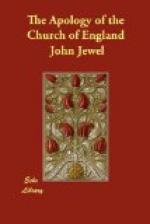Shortly to speak. This universal religion which Christian men profess at this day was called first of the heathen people a sect and heresy. With these terms did they always fill princes’ ears, to the intent when they had once hated us with a predetermined opinion, and had counted all that we said to be faction and heresy, they might be so led away from the truth and right understanding of the cause. But the more sore and outrageous a crime heresy is, the more it ought to be proved by plain and strong arguments, especially in this time, when men begin to give less credit to their words, and to make more diligent search of their doctrine, than they were wont to do. For the people of God are otherwise instructed now than they were in times past, when all the bishops of Rome’s sayings were allowed for Gospel, and when all religion did depend only upon their authority. Nowadays the Holy Scripture is abroad, the writings of the Apostles and Prophets are in print, whereby all truth and Catholic doctrine may be proved, and all heresy may be disproved and confuted.
Sithence, then, they bring forth none of these for themselves, and call us nevertheless heretics, which have neither fallen from Christ, nor from the Apostles, nor yet from the Prophets, this is an injurious and a very spiteful dealing. With this sword did Christ put off the devil when He was tempted of him: with these weapons ought all presumption, which doth advance itself against God, to be overthrown and conquered. “For all Scripture,” saith St. Paul, “that cometh by the inspiration of God, is profitable to teach, to confute, to instruct, and to reprove, that the man of God may be perfect, and thoroughly framed to every good work.” Thus did the holy fathers always fight against the heretics with none other force than with the Holy Scriptures. St. Augustine, when he disputed against Petilian, a heretic of the Donatists: “Let not these words,” quoth he, “be heard between us, ‘I say, or you say:’ let us rather speak in this wise: ‘Thus saith the Lord.’ There let us seek the Church: there let us boult out our cause.” Likewise St. Hierom: “All those things,” saith he, “which without the testimony of the Scriptures are holden as delivered from the Apostles, be thoroughly smitten down by the sword of God’s word.” St. Ambrose also, to Gratian the emperor: “Let the Scripture,” saith he, “be asked the question, let the prophets be asked, and let Christ




